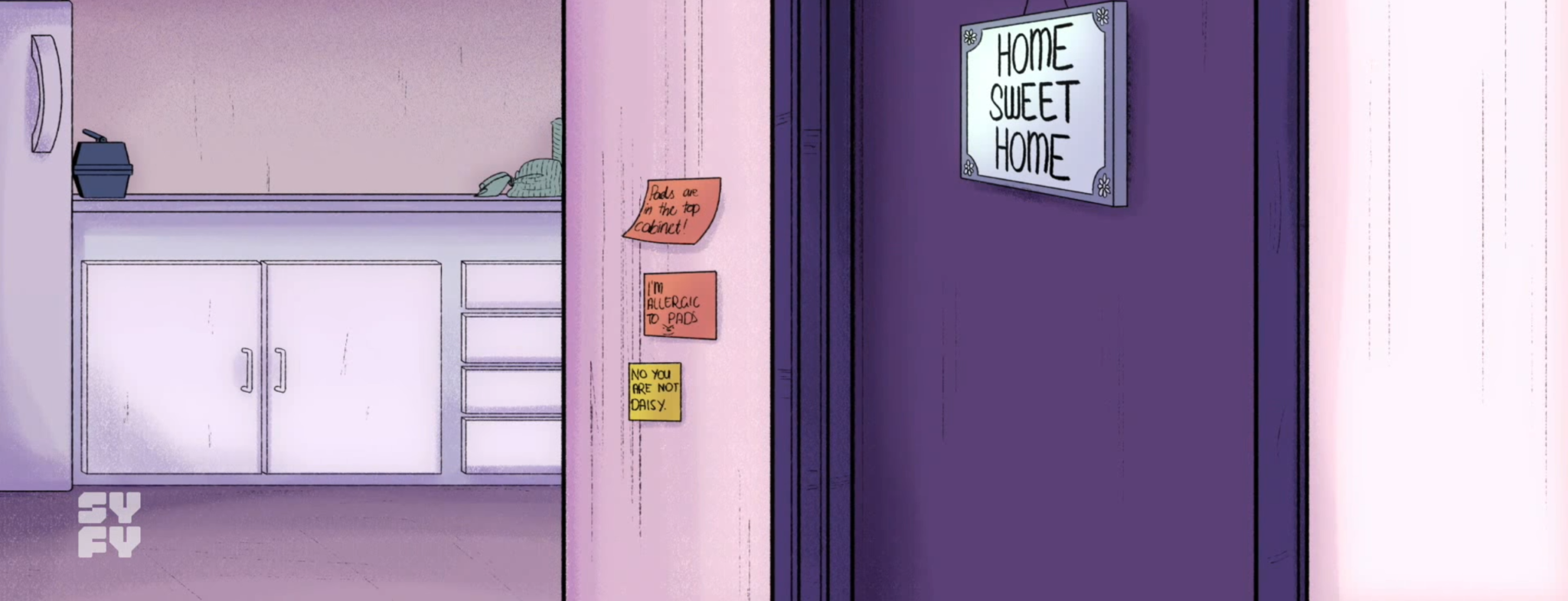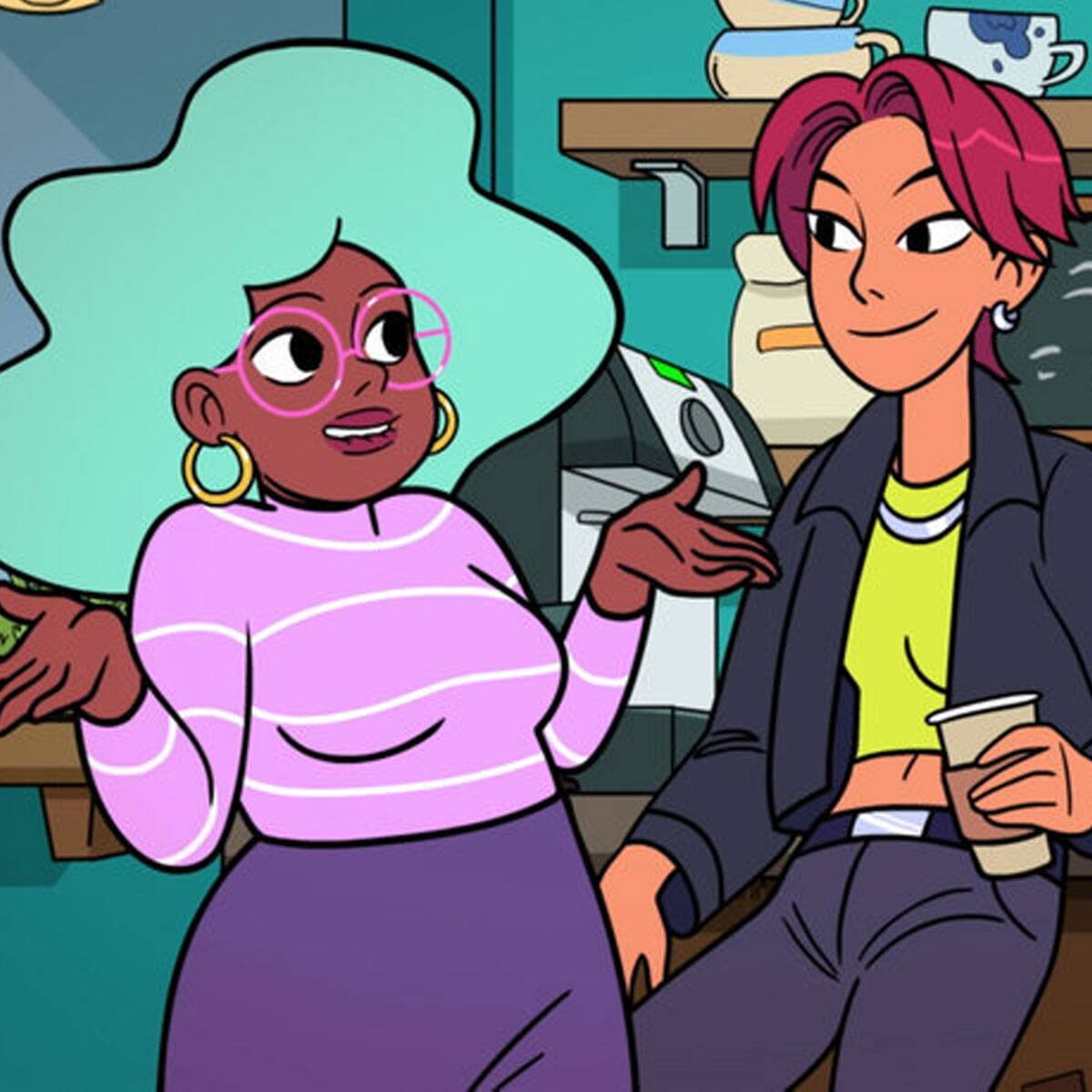Part II — Gender
Introduction
Welcome back to part two of my three-parter on Daisy from Magical Girl Friendship Squad (MGFS)!
As a quick recap, MGFS follows the adventures of two young millennial women, Alex and Daisy, after they receive magical powers. Their powers come from Nut, the creator of the universe who must take the form of a red panda while staying on Earth. Throughout the season, Alex and Daisy battle demonic monsters that work at the behest of Corvin and his boss Verus, the latter a villainess intent on destroying the universe in service of a higher, parasitical being. The young women also battle the normal angst of young adulthood; including the struggle of making the rent, keeping a clean apartment, and figuring out who they are.
Protagonist Daisy loves to party and focuses on earthly pleasures. She approaches the world with humor and impracticality. For example, when she has to choose an object in which to channel her new magical powers, she chooses her prized bong that is in the shape of Tom Selleck’s face and which she affectionately calls ‘Bong Selleck’.
Kelsey Stephanides created the show and worked as showrunner, while Hallie Cantor worked as lead writer for the season. Cantor wrote the first, fifth, and sixth episodes, her material bookending the season. The overall story has two iterations whose differences reveal the evolving creative process: the pilot series Magical Girl Friendship Squad: Origins versus the main version, MGFS. Bisexual actress Anna Akana played Daisy in both series, even predating Cantor and many animators due to her involvement in Origins.
In two episodes of MGFS, the main series, Daisy’s laptop had a trans pride sticker on the front, and the subsequent speculation from viewers led to online discussion about her possibly being a trans woman. Those episodes, 1×02 and 1×03, featured different writers than Cantor.
Cantor fueled speculation after she answered a fan’s question on Twitter, explaining, “As far as I know we haven’t (yet!) identified her as trans or cis, @kelseynides who created her might have a diff answer.” Her ambiguity is significant because Akana contradicted her when pressed by fans before and after Cantor’s response. Akana had been pushed to contradict many fans’ headcanons after a person accused her, a cis woman, of taking a role that could have gone to a trans actress. Akana made clear that Daisy has the same identities as her — cisgender, bisexual, Asian-American; stressing the first two. (I covered that debacle in-depth in part one.)
Akana mentioned in a few tweets her deep involvement with the production of the show and the fact that she discussed Daisy’s gender and sexuality with the writers. Her statements combined with two elements from the show make clear that Daisy’s story, as it was presented in the first (and currently only) season, differs from trans women’s experiences in noticeable ways. While Daisy theoretically could be a non-binary woman, nothing about her, as we’ve seen so far, has indicated that. This is in no way done to quash any fan’s headcanon but rather to show that regardless of the sticker, the text supports Daisy being read as a cis woman.
MGFS and Menstruation
In cinematic storytelling like animation, visual elements typically stick with viewers more so than the actual text. But the text forms the foundation of any story, and thus, when it comes to interpretation and debates on ‘canon’, the text takes precedence. Dialogue in the first episode — which Hallie Cantor wrote and which retained many conversational elements from the Origins pilot — hint at Daisy being a cis woman. It comes in the form of a joke, but the humorous element does not diminish how it reflects Daisy’s characterization.
After Nut gives Alex and Daisy powers, she reveals that she will depend on them to protect her and the universe. The young women protest, citing their bad finances and general life instability as reasons for them being bad guardians. Then Daisy ashamedly says, “I used a W-2 as a pad last week,” as an example of her chaotic adulthood. This line also implies that she menstruates. Her joke fits into an experience common to cis women of being caught unprepared by a period and having to improvise, Cantor’s joke taking the situation to an extreme using an object associated with the hum-drum responsibilities of adulthood. Trans women experience menstruation symptoms too — such as mood swings and cramping — but they do not need pads. We share hormonal experiences but differ in other biological aspects, so the fact that Daisy needs pads puts her into the cis category.

The joke being so cisgender-ly feminine becomes more relevant when considering the version of that joke from Origins. In the first episode of Origins, Daisy quips with a smile, “I’m wearing a grocery bag as underwear,” in an attempt to dissuade Nut from giving her responsibilities. Thus, Cantor changed the details of the joke and the tone, adding the implication of cis female biology. Her change reflects a shift in writing between Origins and MGFS because as a show, MGFS regularly employs imagery related to menstruation and cis women’s reproduction. Most of the imagery comes from the fact that Alex’s powers are stored in her birth control case and Alex subsequently often casting hormonal-themed magic in battle, like giving a female monster cramps. Origins had left out a lot of that kind of imagery, so Cantor’s change reflects this new motif. But it also implies that she intended Daisy to be a cis woman. Notably, she did not give her interpretation in her tweet on the subject, her ambiguity unfortunately setting up many fans for disappointment.
In addition, while not explicit, at one point Origins implies that Daisy menstruates. In Origins 1×02, three sticky notes hang beside the bathroom that track a conversation between Alex and Daisy about where Daisy keeps pads. One of her sticky notes reads, “I’m allergic to pads,” with a devilish smiley face. Alex’s note retorts, “No you are not Daisy.” Many things changed between versions of the show, but the fact that a pad-related joke feature Daisy in both further cements the likelihood that Kelsey Stephanides and the writers intended Daisy to be cis.
Womanhood does not revolve around biology, but for most cis women, our experiences as women include the menstruation cycle. MGFS was actually a breath of fresh air for me because of how much it addressed menstruation in comedy and action sequences. It normalized and valorized cis women’s bodies in a way that simply does not happen enough in media. So often periods only appear in stories because a woman’s reproductive capacity is suddenly impacting a male character, usually in the form of a potential pregnancy.
Similarly, trans women deserve to have the details common to their experiences of day-to-day life explored. Quality representation hinges on the details. Trans women do not have male privilege growing up, as Terfs like to argue, but they do have experiences as women that differ from cis women’s in certain respects, and it is important to acknowledge those differences. When considering the text of the first episode alone, the details provided for Daisy’s life experiences do not match those of a trans woman.
Daisy’s Religious Background:

Furthermore, Daisy’s backstory as a cult survivor also seems to undermine the possibility of her being trans. Her parents raised her as a member of The Church of the Savior’s Unthinkable Torment, a “highly specific religion” that encourages maximum suffering for its worshippers. Its biggest holiday, the Agony Solstice, has traditions such as shame circles and ritualistic dehydration and sleep deprivation. The B-plot of 1×03 focuses on Daisy preparing for her parents’ arrival and having to perform religiosity for them.
Daisy does everything in her power to convince her parents that she still practices their tenets, even though having to hide her true, free-wheeling, sexually liberated self from them saddens her. Her being a trans woman would immediately clash with all of this because she presents and lives as a woman in front of them. Daisy never changes her hair style or tries to bind her chest in preparation for their visit. Then, when her parents arrive, her father greets her as “daughter.”
This isn’t to say that that trans women cannot come from religiously extreme environments. Many of them do! However, The Church of the Savior’s Unthinkable Torment appears to be parodying extreme Christianity, which we know from our world is not friendly to trans experience and do not typically allow trans children to be themselves. In short, the extreme religious beliefs her parents hold do not make them seem like parents who would love and support a trans child. If she were a trans woman, she would be ‘out’ and being ‘out’ as queer in any way does not fit into a religion that demands pain at all costs.
The Church of the Savior’s Unthinkable Torment discourages happiness — in body and soul. Daisy had to hide anything remotely related to pleasure; ranging from sex toys to objects as benign as her laptop, a computer mouse, a magazine, and a feminist book. Conservative cultures tend to conflate issues related to gender and sexuality, and logically, if this church looks down on feminism and sexual pleasure, then it would look down on gender transgression. I cannot fathom a story in which her parents accept her gender, unless Daisy could spin transitioning not as a way to relieve gender euphoria but to make her miserable. In the actual episode, she lies to her parents, telling them that she uses her laptop “only for worship.” She shows them gross click-baitey headlines as proof of the Internet’s toxic effects on emotional well-being. Daisy then, theoretically, could have used transphobia as an argument for transitioning. But introducing such an argument in a story, even as a lie, feels problematic to me.
Again, this is to not imply that trans women don’t have to navigate religious trauma and toxic parents in certain circumstances. Leelah Alcorn’s life and death encapsulate the themes that pervade many young trans women’s lives as they strive for freedom. Rather, Daisy in the context of her characterization does not fit into a trans woman’s backstory upon scrutiny of the details and in consideration of trans women’s cultural experiences. If she were a trans woman whom her parents recognized as ‘daughter’ that meant they accepted her transition, and from what MGFS has shown us, that possibility seems extremely unlikely at the start of the story.
While drafting parts one and two of this trilogy, I had a friend of mine, who is a trans lesbian herself, read them over for reference and for sensitivity. She pointed out to me that the whole debacle on Twitter, Akana having to clarify fans’ misinterpretation because of a background trans pride detail, is the opposite of a situation in the video game industry. The 2018 game Celeste focused on a woman named Madeline, and in the 2019 DLC, fans noticed a rainbow flag and a trans pride flag in a clip of her room. They speculated that this was the creators hinting towards the protagonist’s trans-ness. Writer and director Maddy Thorson, who discovered their gender identity during the creative process, confirmed Madeline’s identity in a 2020 essay, and their thoughts resonate with MGFS — how direct confirmation from dialogue or a creator matters but how the overall story should serve the character’s identity as well. Thorson writes,
“We also didn’t want to pull a JK Rowling and start inserting details post hoc that might feel insincere or forced. Like sure, whatever you say lady, Dumbledore is gay… it’s convenient that this was never mentioned in the books or carried any weight in the plot. In Celeste, I would argue that Madeline’s transness is meaningfully intertwined with her story, but the base game was subtle about Madeline’s identity and feelings (in part because I wasn’t fully conscious of them), and their metaphorical connection to the gameplay. We preferred continuing that mode of communication over saying “yep, she’s a trans.””
The team behind MGFS have not, in a united capacity, confirmed Daisy’s identity one way or the other. But when looking at the story as a whole, and not just one design choice that appeared in two episodes, viewers can easily see that Daisy’s character makes the most sense if she were written as a cis woman.
Conclusion (And a Solution)
All of that in mind, Daisy’s trans pride sticker does not have to go to waste. MGFS could resolve some of this tension, if it gets picked up for a second season, by incorporating canon trans characters and then by making their trans-ness explicit. When considering the narrative possibilities, for example, I considered a backstory in which Daisy got the laptop from a trans ex-girlfriend and then just never removed the sticker, all of which could come out in an episode that involves Daisy’s romantic past in more detail. Or, if the writers wanted to further explore her parents’ Church, they could create a friend or ex-girlfriend from that community who struggled with coming out as trans, Daisy subsequently getting the sticker as an expression of her allyship.
That original Twitter thread on trans voice actors being cast in trans roles still resonates here. The animation studio behind MGFS, Cartuna, has so many options. For example, Morgana Ignis is a voice actress whose work on the queer animated web series Helluva Boss could easily translate to MGFS. She voiced two characters on Helluva Boss — a fish monster and then a demon called Sallie May, a transgender woman. Ignis confirmed Sallie Mae’s transness on Twitter and Helluva Boss’s official Twitter account concurred. The character wikia also notes that Sallie May’s design has physical attributes similar to male demons, indicating that the animators and writers are thankfully on the same page.
Trans characters can be portrayed with subtlety, and if MGFS goes forward, hopefully it will have these communication issues in mind when scripting and designing future storylines.
Next week, to wrap up Pride month, I will be reviewing Daisy’s bisexuality and how she fits into the greater canon of bisexual characters. See you all then!

Images courtesy of Cartuna and TZGZ Productions
Have strong thoughts about this piece you need to share? Or maybe there’s something else on your mind you’re wanting to talk about with fellow Fandomentals? Head on over to our Community server to join in the conversation!

